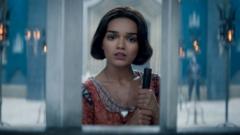The backlash against Rachel Zegler, star of Disney's live-action Snow White, highlights broader issues of representation and political discourse within Hollywood. Amid mixed reviews, Zegler’s comments on the original film and her outspoken political views have fueled a contentious debate that reflects cultural divides, especially surrounding women of color in the entertainment industry.
The Polarizing Impact of Rachel Zegler in Disney's Snow White Remake

The Polarizing Impact of Rachel Zegler in Disney's Snow White Remake
Rachel Zegler faces criticism and support amid the release of Disney’s newest adaptation of Snow White, sparking a heated cultural debate.
Rachel Zegler, the 23-year-old actress portraying Snow White in Disney's live-action remake, has become the center of a polarizing debate following the film's release. While some are quick to criticize her based on perceived shortcomings of the adaptation, others defend her against what they view as unjust backlash. This dynamic illustrates the often harsh scrutiny faced by actors from underrepresented backgrounds, particularly women of color.
The latest adaptation of Snow White, released earlier this month, encountered mixed to disappointing reviews. Critics have noted that despite its box office success in North America, it has not met revenue expectations, leading to finger-pointing at Zegler. The producer's son, Jonah Platt, recently criticized her on social media for allegedly injecting her personal politics into the film's marketing, which he claims negatively impacted its financial performance.
Zegler’s comments leading up to the release attracted attention and criticism, particularly her perspectives on the original film, which she described as "extremely dated." Her assertion that the classic animated feature's love story portrayed themes of stalking sparked controversy. Some have interpreted her remarks as attacking Disney's cherished legacy.
Beyond her comments on the film, Zegler's political viewpoints have also generated considerable debate. After expressing a desire for peace for Trump supporters on social media, the actress faced backlash, prompting discussions on whether her politics influenced audience reception. Critics argue that she has become a significant target not just because of her role in the film but due to her identity as a young Latina actress who has expressed progressive views.
The scrutiny placed upon Zegler is emblematic of broader cultural tensions within the entertainment industry. Experts point out that discussions around race, gender, and politics often put minority actors, especially women, at risk for harsh criticism. The fallout from her role has intensified discussions about Hollywood’s responsibility to protect its talent, especially actors of color who often bear the brunt of social media backlash.
As Zegler continues to navigate this challenging landscape, she remains committed to her craft. Announced future projects, such as joining a production of Evita in London's West End, suggest that she will continue to make her mark in the industry. Zegler's journey embodies the delicate balance between personal expression and public perception, raising important questions about representation and the evolving narratives in Hollywood. Despite the turmoil, many recognize her talent, and her young age leaves ample opportunity for growth in an ever-changing media landscape.




















